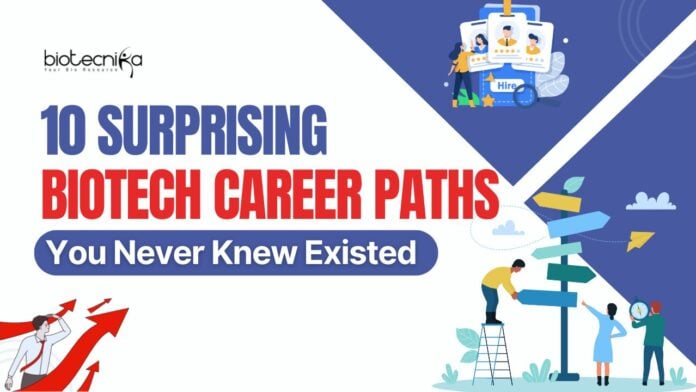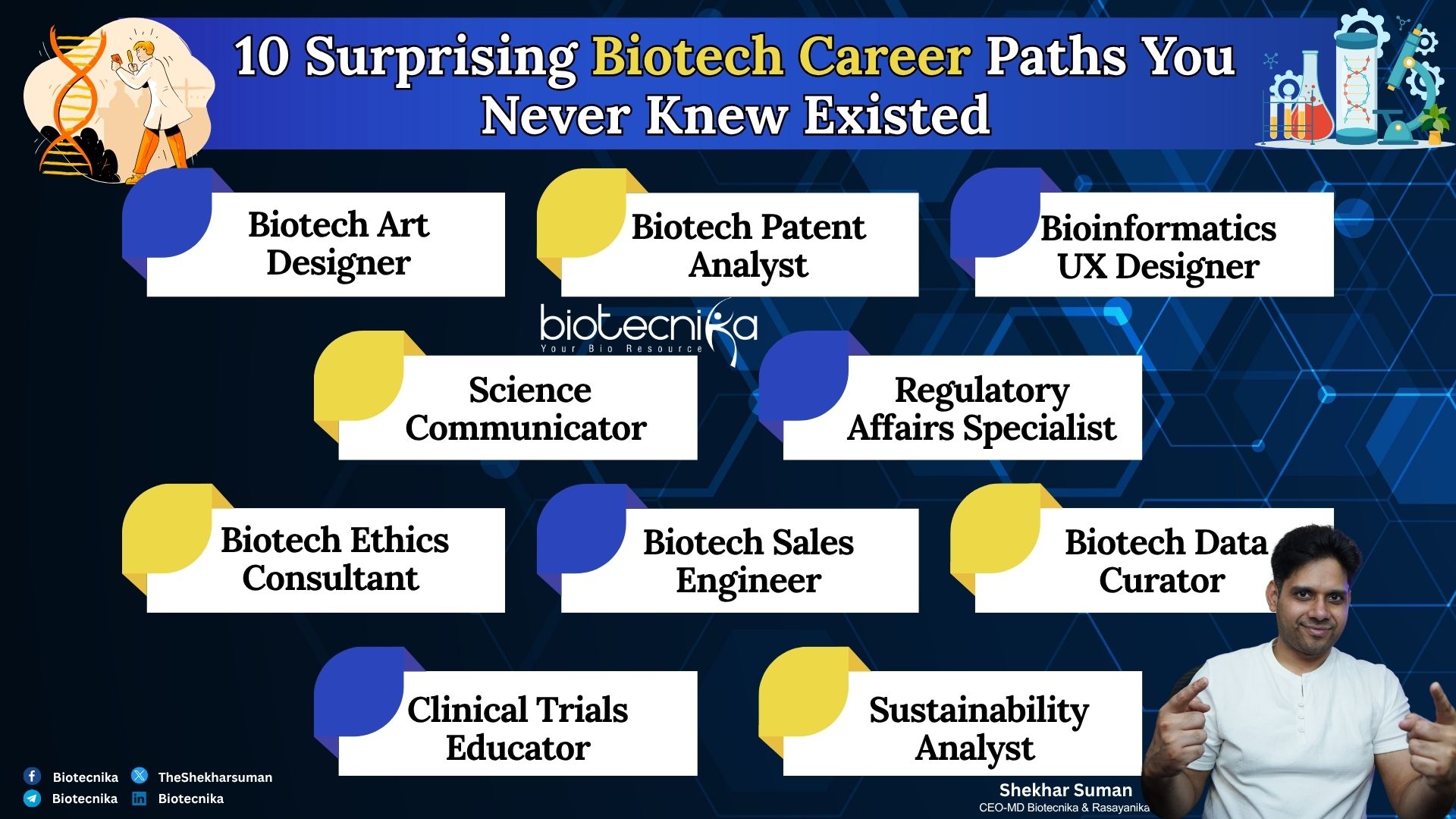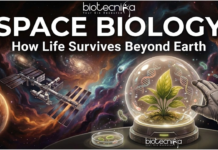Hidden and Emerging Biotechnology Careers You Probably Haven’t Heard Of
In the ever-growing field of biotechnology, many are aware of multiple job opportunities such as lab technician, molecular biologist, geneticist, bioinformatician, etc. Whereas many more roles are unexplored, and those hidden roles are equally exciting in the biotechnology field. This article aims to explore those career paths, and we’ll explore 10 surprising biotech career paths you never knew existed. Whether you’re a student or a professional looking to switch careers, this article will be a guide to help you understand those hidden opportunities.
1. Biotech Art Designer: Where Science Meets Creativity
Visualization is the key to understanding any concept. Have you ever seen a colorful 3D model of DNA or a virus in a textbook or website? I am sure this would have made the understanding much clearer. A biotech art designer creates those visuals. This role blends biology and digital design. One should have a thorough knowledge of biotechnology to design these visuals.
A biotech designer usually creates scientific illustrations and animations. This usually involves using various software, such as Adobe Illustrator and Blender. This not only helps researchers understand complex ideas but also enables educators to explain the concepts in much simpler ways.
A few much-needed skills for this job role are as follows;
- Biology knowledge
- Artistic creativity
- Digital design software skills
This will be a perfect biotech career path if the person is interested in science and the arts.
2. Biotech Patent Analyst: The Legal Side of Innovation
A biotech patent analyst helps researchers and companies file patents and protect their innovative ideas. For this, an analyst should have a detailed understanding of whether new inventions can be patented. How it can be proceeded and what type of patent laws are applicable in different countries needs to be understood thoroughly.
As a biotech patent analyst, one should analyze scientific papers and patents and write detailed reports on them. Most of the work will involve collaborating with lawyers and researchers.
Skills Needed:
- Strong understanding of biotech research
- Attention to detail
- Some knowledge of intellectual property laws
If you enjoy reading and researching, this will be a perfect role.
3. Bioinformatics UX Designer: Improving Software for Scientists
One of the unique job roles that you can explore is that of a bioinformatics UX designer. The job involves understanding complex software to analyse biological data. Most scientists use this software to analyse their data, which could be a role where you will be a part of research by helping them analyse data effectively and efficiently.
A bioinformatics UX (User Experience) designer makes these tools easier.
What You Do:
- Interview scientists to understand their needs
- Create wireframes and interface designs
- Work with software engineers
Skills Needed:
- Basic biology and bioinformatics knowledge
- UX design and research skills
- Teamwork and communication
This career is an excellent mix of tech, biology, and design.
4. Science Communicator: Making Biotech Understandable
If you are a science enthusiast who loves to communicate the recent trends and developments happening in the research field in simpler words, then you are a perfect fit for this role. A science communicator works in media, education, or companies to share biotech news with the public, making it more engaging by building curiosity.
What You Do:
- Write articles, blogs, and social media posts
- Host podcasts or YouTube channels
- Speak at events or webinars
Skills Needed:
- Excellent writing and speaking skills
- Basic biotech understanding
- Creativity and storytelling
This job is vital to building public trust in biotech.
5. Regulatory Affairs Specialist: The Rule Keeper of Biotech
Every biotech product must follow safety rules. A regulatory affairs specialist ensures that products meet government standards.
In this job role, candidates are responsible for preparing and approving documents.
- Prepare documents for approvals
- Communicate with regulatory bodies
- Track changes in laws and policies
Skills Needed:
- Knowledge of biotech and legal guidelines
- Organizational skills
- Ability to work under pressure
It’s a career with high responsibility but also high demand.
6. Ethics Consultant in Biotech: Guiding Right from Wrong
With the advent of gene editing technologies, the compliance with ethics is more important than ever. Biotech ethics consultants help companies make morally sound decisions.
What You Do:
- Review new research or products
- Analyze ethical impacts
- Write ethical reports or consult with boards
Skills Needed:
- Deep understanding of bioethics
- Clear communication
- Awareness of social and legal issues
This job is perfect if you are passionate about doing what’s right in science.
7. Biotech Sales Engineer: Bridging Science and Business
Many companies sell biotech equipment or software. A biotech sales engineer explains how their products work to buyers.
This job role requires skills, such as technical knowledge about the products. To sell their products effectively, one should also be a strong communicator and possess negotiating skills. This job role often requires visiting labs and hospitals and providing a demo on the products one needs to sell.
It’s an excellent option for outgoing people who enjoy travel.
8. Biotech Data Curator: Organizing Scientific Knowledge
The biotech sector produces a vast amount of data every day. Curating this data will facilitate further research. A biotech data curator ensures that the immense data generated is well-organized, labelled, and managed for future use.
The candidate should ensure the well-organized maintenance of scientific data and the integrity of data quality. One will work closely with researchers and scientists.
Skills required for the job role are as follows;
- Basic coding or database knowledge
- Biology and lab experience
- Attention to detail
This biotech career path is vital for making research more efficient.
9. Clinical Trials Educator: Helping People Understand Studies
New drugs undergo trials before being released. A clinical trials educator teaches participants and staff about these studies.
What You Do:
- Create training materials
- Meet with patients or staff
- Make sure everyone understands procedures
Skills Needed:
- Good people skills
- Knowledge of clinical trial steps
- Teaching or communication abilities
This career combines education, care, and science.
10. Sustainability Analyst in Biotech: Going Green with Science
As we all know, climate change is a big concern not just in one place but worldwide. A biotech sustainability analyst can help find answers to this biggest concern. Biotech can help fight climate change. A sustainability analyst finds ways for companies to be more eco-friendly.
The job role requires understanding and performing carbon footprint measurements. The candidate should be a futuristic thinker and suggest changes for production and development areas. One will also be responsible for documenting and writing sustainability reports.
Skills Needed:
- Understanding of environmental science
- Data analysis, Passion for sustainability
This is ideal for those who are passionate about using biotech solutions to heal the planet.
How to Start Your Biotech Journey
If you want to explore these career opportunities, consider taking these steps to make your exploration journey easier.
The first step is to understand your area of interest, whether you like writing, coding, teaching, or designing. After that, you should also consider taking short courses that will help you further understand the career path. Numerous courses are available on the market, but you should ensure the course is valid and from a genuine source.
- Apply for genuine courses via LinkedIn or biotech-related website portals, OR you can join courses from Biotecnika that offer biotech-specific modules.
- One should be updated with the latest developments and trends in the sector, and to boost this knowledge, start following authentic sources on social media platforms. To be industry-ready, one should know the day-to-day news and new developments in the industry. Also, join LinkedIn groups that provide the necessary information, such as biotech webinars, career fairs, industry-ready skillset tips, etc.
- Consider doing an internship or volunteering to learn in companies. These hands-on experiences will always set you apart.
Biotech is more than test tubes and microscopes. From artists to analysts, communicators to coders, there is space and scope for everyone. The next time someone asks what careers exist in biotechnology, surprise them with these options. These 10 surprising biotech career paths you never knew existed show that biotech is no longer just about working in a lab.
You can combine your passions for writing, art, teaching, law, or the environment with science, making biotech one of the most flexible industries for career development.
































